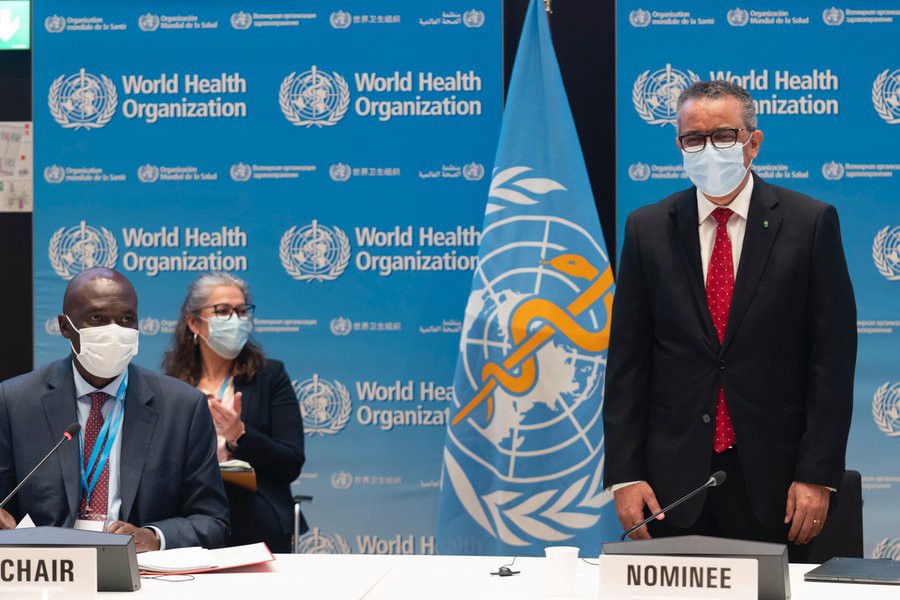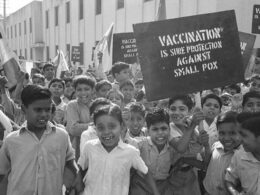Health Policy Watch
Kerry Cullinan & Elaine Ruth Fletcher
25/01/2022
Despite earlier disruption from Ethiopia, Dr Tedros Adhanom Ghebreyesus received overwhelming support for his nomination for a second term as World Health Organization (WHO) Director-General from the body’s executive board on Tuesday.
As the only nominee, Tedros is guaranteed to be re-elected at the next World Health Assembly in May.
All WHO regions expressed their support for is nomination, including the African region which commended the global body for its clear nomination process — the message delivered by a representative from Burkino Faso, a country in limbo since a military coup on Sunday night.
The WHO Executive Board #EB150 nominated @DrTedros for WHO Director-General position to be decided at #WHA75 in May 2022 pic.twitter.com/q7Mo5LgGEf
– World Health Organization (WHO) (@WHO) January 25, 2022
As part of the nomination process, Tedros gave an address to the board and answered a number of questions.
During his address, he appealed for “assessed member state contributions” to cover at least half of the WHO’s roughly $3.5 billion a year budget.
At present, assessed contributions (fees based on countries’ GDP) account for less than 20% of the budget , with the remainder from voluntary contributions which are usually earmarked for particular issues, preventing flexibility and equitable regional distribution, said Tedros.
Financing dominated the second day of the board meeting, with Germany’s Bjorn Kummel, chair of the Working Group on Sustainable Financing (WGSF) describing the global body’s finances as “rotten and unsustainable for the future”.
In the run-up to the board meeting, Kummel’s group had failed to reach consensus on the proposal that at least half of the WHO’s budget should come from assessed contributions. The board agreed on Tuesday to extend the group’s mandate until May in the hope that a contribution formula can be agreed on.
The US and Japan are holdouts on increased member contributions unless the WHO guarantees to improve its financial governance.
During afternoon proceedings, US representative Loyce Pace called for a “holistic package of measures” to ensure WHO sustainable finance, that included improved governance and transparency on “current funding mechanisms, prioritisation, budget processes, improved cost efficiency and early member state inclusion in the decision-making processes”.
Sustainable financing for @WHO is a clear priority. Member States should tackle this challenge collaboratively and holistically — looking at governance, transparency and flexible voluntary contributions — to close the gap for better global health preparedness and response. #EB150
– Assistant Secretary Loyce Pace (@HHS_ASGA) January 25, 2022
When Japan asked Tedros how he was going to reform WHO’s financing, particularly “accountability and transparency and financial discipline”, he asked for the country’s support to increase members assessed contributions.
He explained that under his leadership voluntary contributions had risen from around $14m in 2017 to almost $260m — but no progress had been made on increasing assessed contributions.
However, Tedros later assured members that he was committed to increased accountability and transparency, and would deliver this.
Transformation plan — where has it led?
Shortly after taking office, Tedros undertook a massive transformation plan for WHO, aimed at making the organization more transparent and responsive to the needs of member states, and with more “leadership” in developing regions and countries.
However, COVID-19 forced the WHO to shift focus from internal reforms to responding to an immediate crisis, while a temporary halt in US funding under former US President Donald Trump sparked a short-term financial crisis.
A key element in the transformation plan, to move more funding and positions to WHO’s six regional and 152 country offices was stymied by the COVID-19 crisis.
The pandemic also cut short a new WHO system of more regular rotations of staff in and out of headquarters to regions — along the lines of diplomatic missions — to which there was already considerable staff opposition pre-pandemic.
As a result, WHO is falling short of what has been a decades-long target for a 75%-25% split of its budget between regions and headquarters with over 30% of the total budget being spent in headquarters today.
This goal was surpassed in 2016/7, the last budget cycle before Tedros took office, when 84% of the budget was spent in regions, and only 16% at headquarters.
The net result is the persistent under-financing of African and South-East Asian regions — which generally host the biggest disease burdens in the world.
The African Region only gets 22% of WHO funding — although that is supplemented by direct bilateral support from the US and other donors through channels like PEPFAR — the US HIV/AIDS relief plan which has been a backbone of HIV/AIDs battle since 2003 — funnelling some $10.8 billion into AIDS programmes — and hybrid AIDS/COVID efforts in 2021.
The Western Pacific (including China, Pacific Island States, Australia and Japan) receives only 4.28% of funding.
The South-East Asia Region only gets 6% — about the same as the European Region — whose budget is also self-financed by EU member state contributions. In contrast, the conflict-wracked Eastern Mediterranean gets 26% of the WHO programme budget.
The Americas region gets the least, less than 3% — although WHO support is is massively supplement by the US and other North American donors that fund the powerful Pan American Health Agency (PAHO), as a semi-autonomous agency.
Not without reason, however, responding to health emergencies has also consumed a huge portion of WHO’s recent budget — some 41 % of resources in 2021.
UN Foundation Vice President of Global Health, Kate Dodson, sent a letter to the Board on behalf of a wide group of health organisations appealing for increased funding, which was read out on Tuesday
The letter calls for member states to “agree to increase the share of assessed contributions to the WHO base budget to 50% by 2029”, noting that only a “sustainably financed WHO that is not subject to the political influence of its donors or the whims of funding flows can fulfill its role as the leading technical and normative international body”.
Over-dependence on short-term consultants
Meanwhile, as things stand now, WHO insiders say that the body is overly dependent on short-term consultants that it parachutes into jobs.
Approximately a quarter of WHO staff are on short-term contracts, according to insiders.
25% of @WHO staff is on temporary contracts due to short term financing. Is this the best way to attract top scientific talent? Can the🌍really leave vital functions like prequalification of essential medicines to the whims of whether donors want to fund it year on year?
– Kate Dodson (@katesdodson) December 10, 2021
The net result is an organisation that lacks a stable backbone of fixed-term professional staff — from entry to senior levels — that can dare to take unpopular positions and assume leadership roles.
That, along with a weak internal justice system, which was the focus of complaints at last May’s World Health Assembly have also reinforced what some WHO insiders describe as “authoritarian” tendencies in the DG’s office and Tedros’ leadership style — which also have diminished the independent authority of his Assistant Director Generals — who are anyway all politically appointed.
nuary 25, 2022.
Names cited
Germany’s Bjorn Kummel, chair of the Working Group on Sustainable Financing (WGSF)
UN Foundation Vice President of Global Health, Kate Dodson








